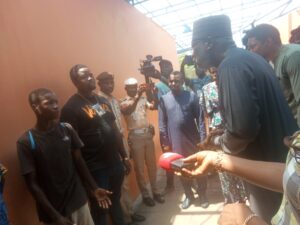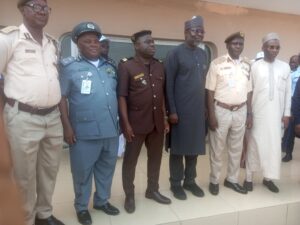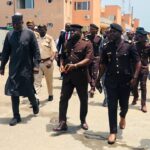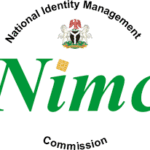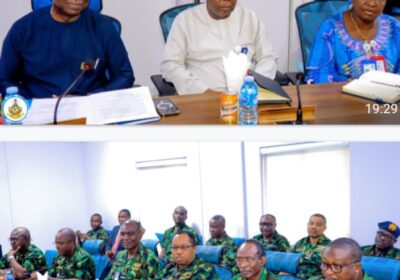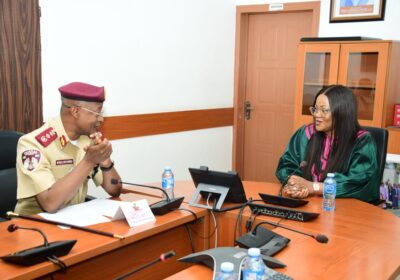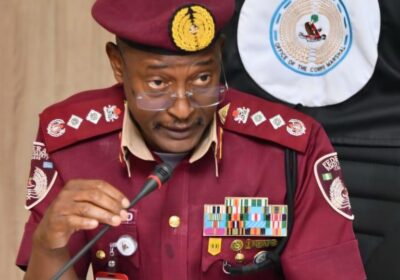Dr. Omar Alieu Touray, ECOWAS President, Displays Strategic Leadership at the Heart of West Africa’s Border Route, Listens to Citizens. By Raymond Enoch
In a rare and insightful visit to one of West Africa’s busiest trade corridors, the President of the ECOWAS Commission, Dr. Omar Alieu Touray, traveled from Lagos to the Nigeria-Seme Border at the Republic of Benin, to hear firsthand from citizens and security personnel about the challenges impeding free movement across the region.
The mission, which was aimed at addressing concerns surrounding the implementation of the ECOWAS Free Movement Protocol, also served as a reality check for the leadership of the regional bloc.
Upon arrival, at Seme Border, Dr. Touray met with Heads of Security Operatives, several border community members and operators who voiced their frustrations about the current state of affairs at the border.
Umar Danladi, a motorcycle operator, complained about the excessive and unnecessary checks by security forces, which often result in delays and unnecessary harassment.
Tunde Musa, a cross-border trader, also took the opportunity to call on ECOWAS to provide better assistance to businesses operating along the border. “Our businesses are struggling due to constant stoppages and harassment from security agencies,” he explained, urging ECOWAS to streamline trade protocols.
David Adeoye, a regular driver between Lagos and Seme, echoed similar concerns about multiple checkpoints and the inefficiency of border operations. “The process is slow, and the technology meant to ease traffic, like scanners, hasn’t worked properly for years,” he said, highlighting a major frustration for many involved in cross-border transport.
Certain positive things are also taking place
like a Young Man Wilifried jousogne from Benin Republic who interacted with the ECOWAS Commission President noted that he have unhindered access on the coordinator.
At the Seme Border, Dr. Touray was joined by various security and customs officials from both Nigeria and Benin. In discussions with Dr. Ben, the Controller of Nigeria’s Seme Customs, the President was briefed on significant infrastructure gaps, including poorly maintained scanners, inadequate pedestrian routes, and the absence of essential services like electricity and water.
One of the most pressing issues raised was the condition of equipment. Dr. Ben pointed out that the vehicle scanners and thumbprint machines were often out of order, and the pedestrian infrastructure was in dire need of repair. The lack of proper lighting and communication systems also presented safety risks for travelers and border staff.
Benin’s customs representative also shared similar frustrations, noting that despite efforts to improve operations, the border was still plagued by inefficiencies. “We welcome the ECOWAS President’s visit, but the reality here is much harder than it seems,” he said.
At the end of the inspection, Dr. Touray assured border officials and community members that their concerns would be presented to the ECOWAS Council of Ministers and authority of Heads of States and Government. He also promised to push for practical solutions to ease the challenges at the border, emphasizing that effective regional integration could only be achieved through collaboration and addressing these critical issues.
“We are committed to making this process smoother for the people of ECOWAS,” Dr. Touray concluded. “But this requires action—not just talk.”
As he wrapped up his visit, both the government of Nigeria and Benin’s border officials expressed gratitude for the ECOWAS Commission President’s personal engagement, acknowledging that real change would require continued attention to these long-standing issues.
Speaking to the press after the inspection visit, Dr. Omar Alieu Touray assured that actions would be carried out in order for the citizens of the ECOWAS member states to continue to work together to make the best use of the important and strategic corridors of the West African Sub-Region. He appreciated both the governments of Nigeria and Benin, including the heads of the security agencies, for their engagement and commitment to conveying the concerns to the highest levels of governance in the Commission.